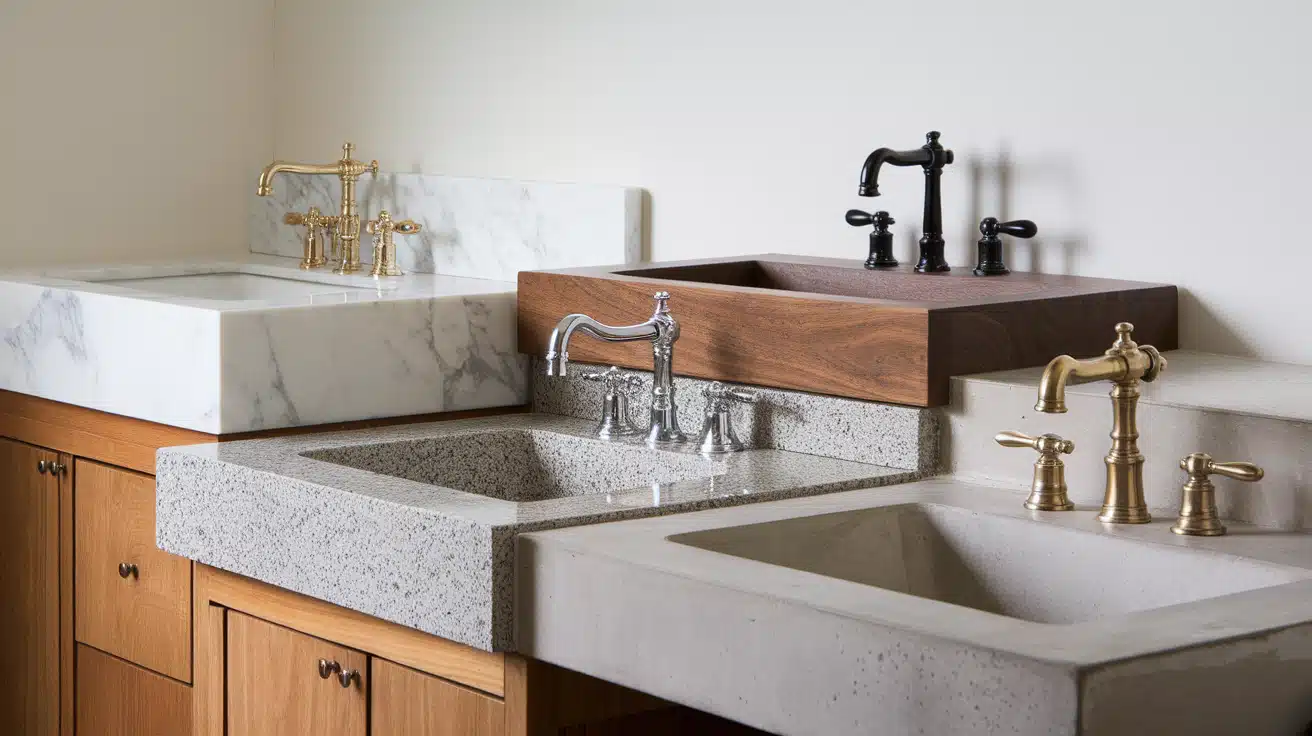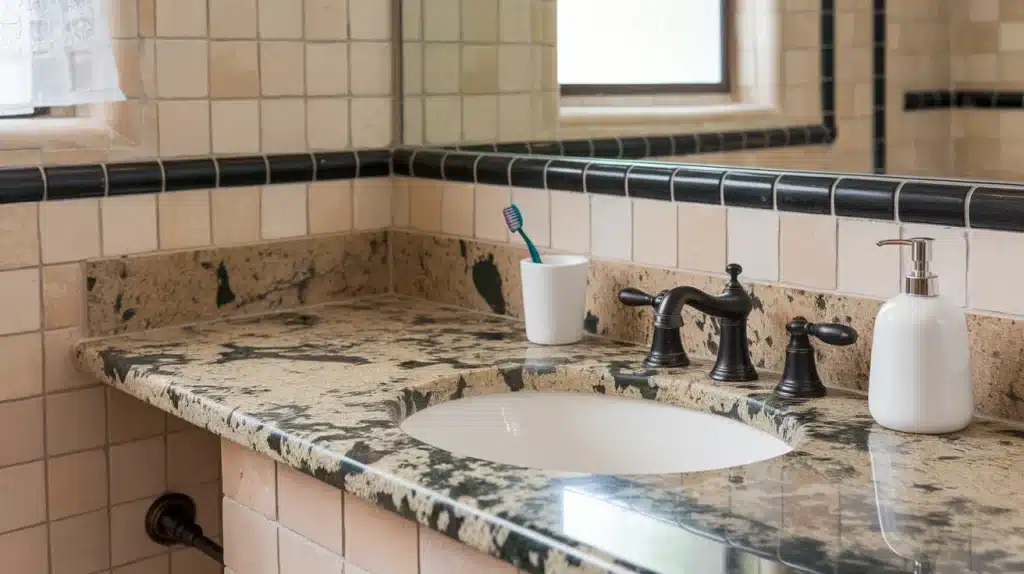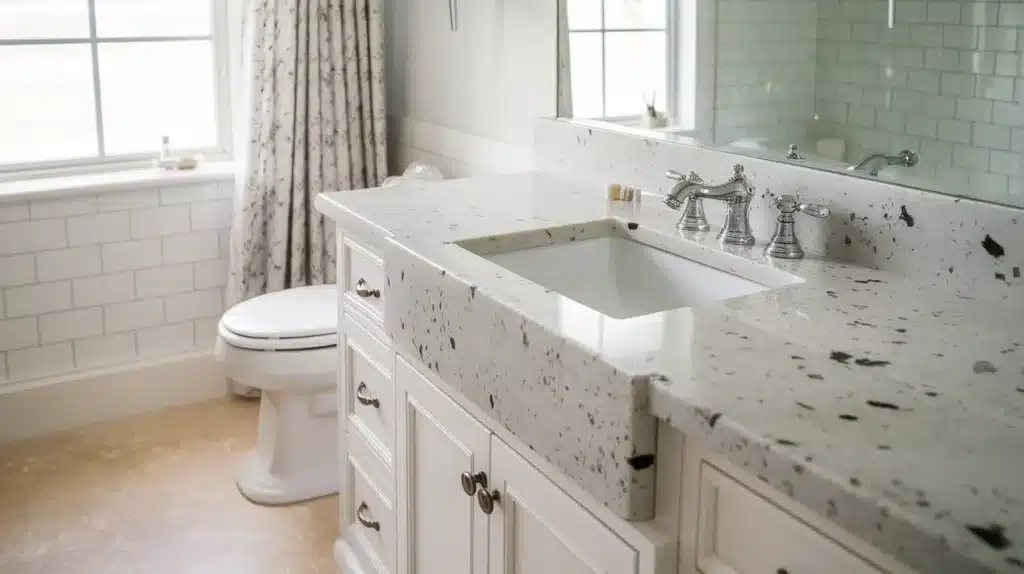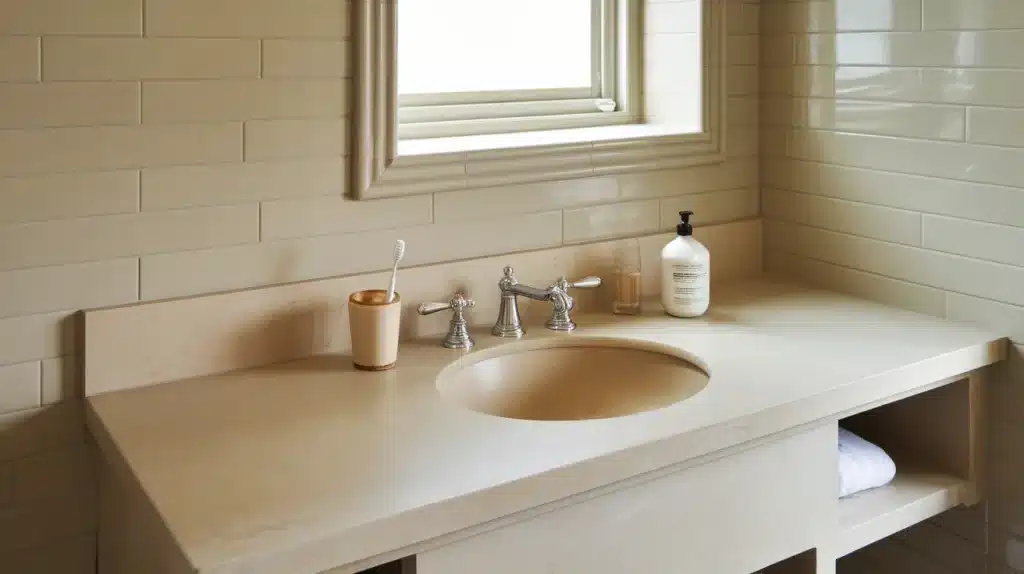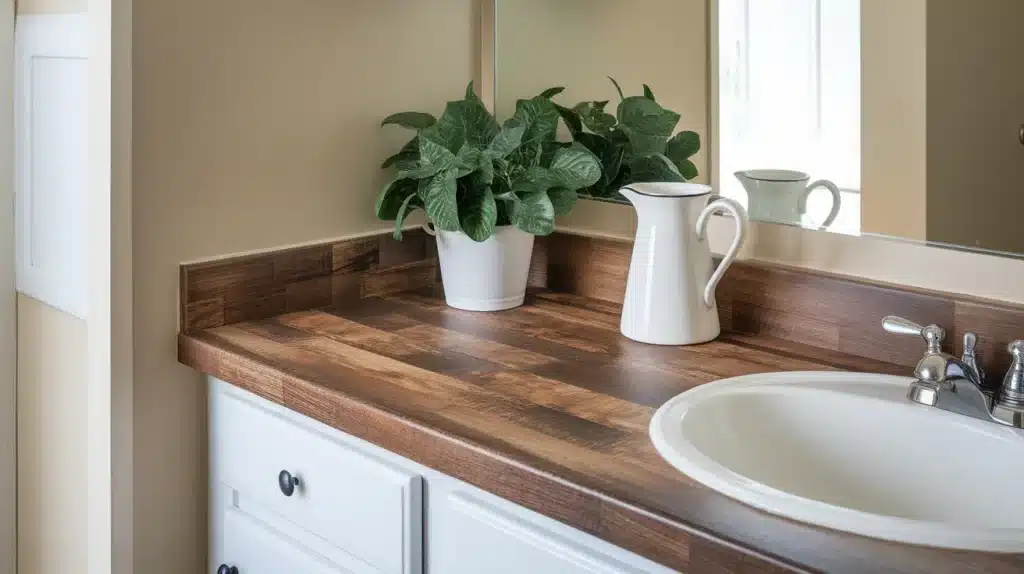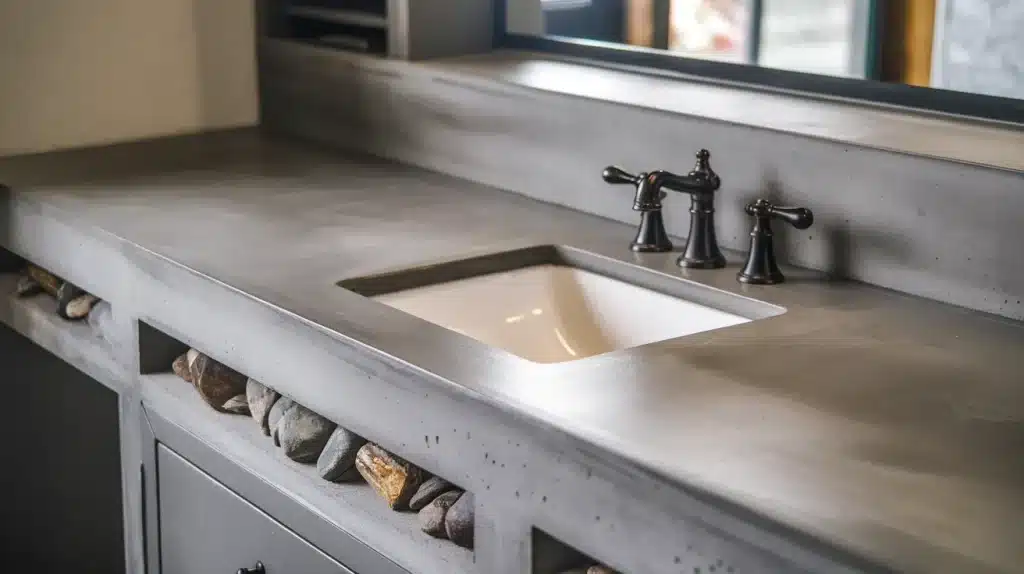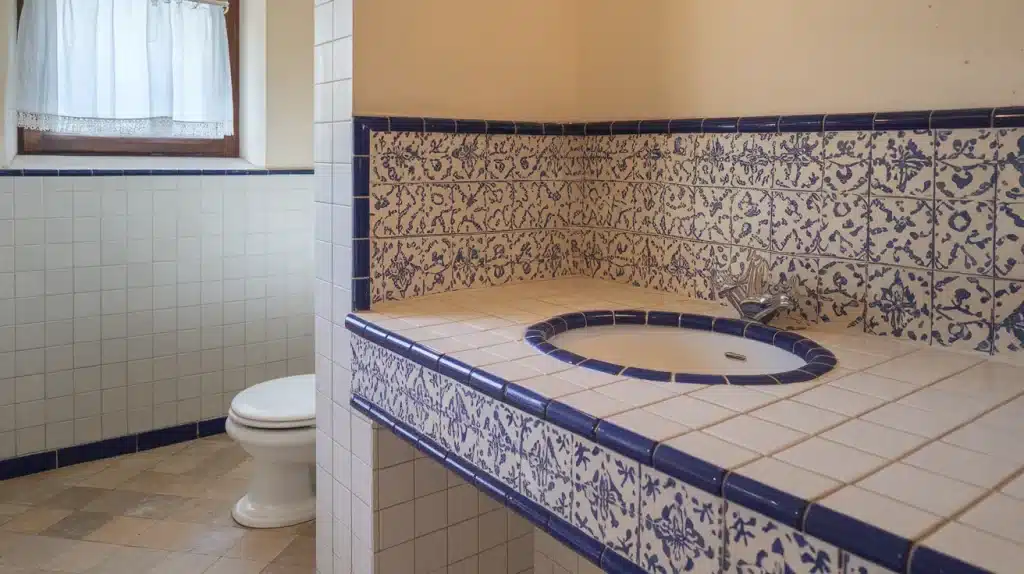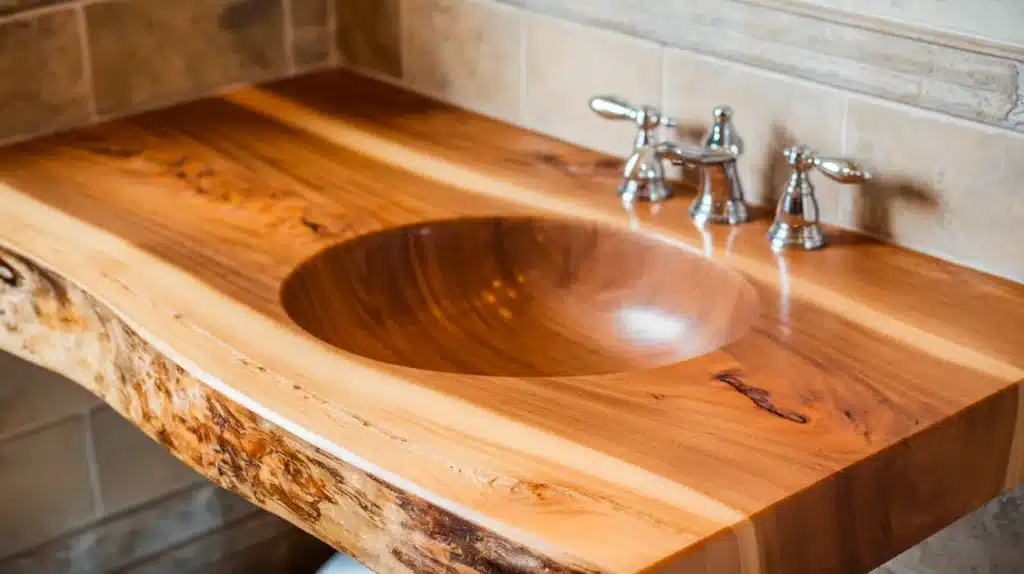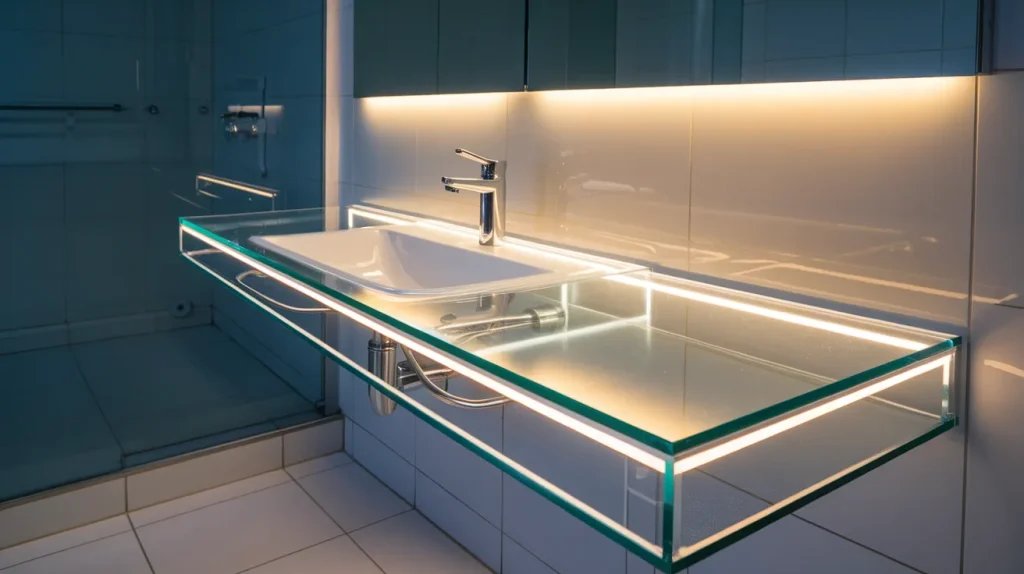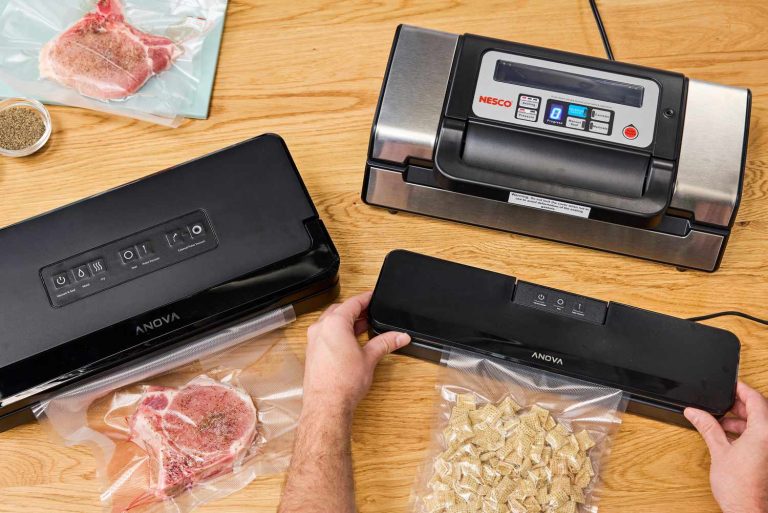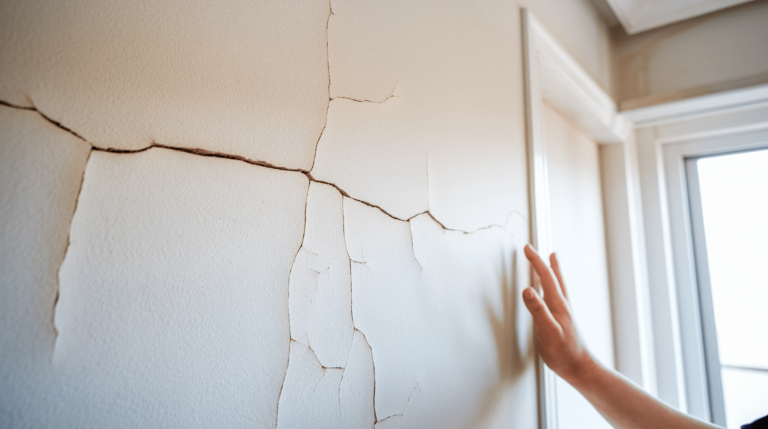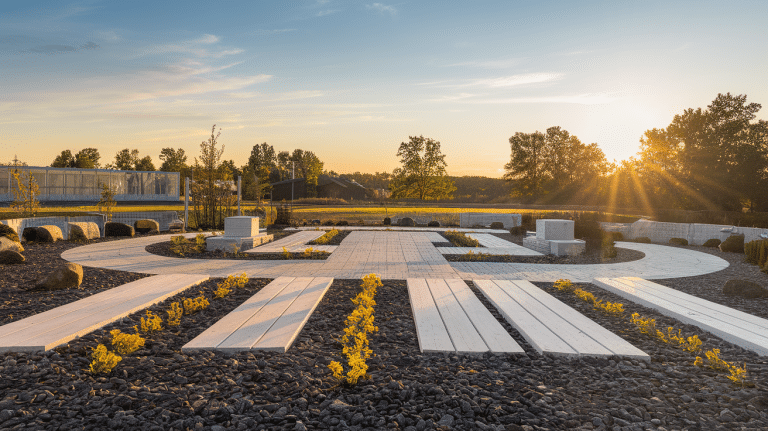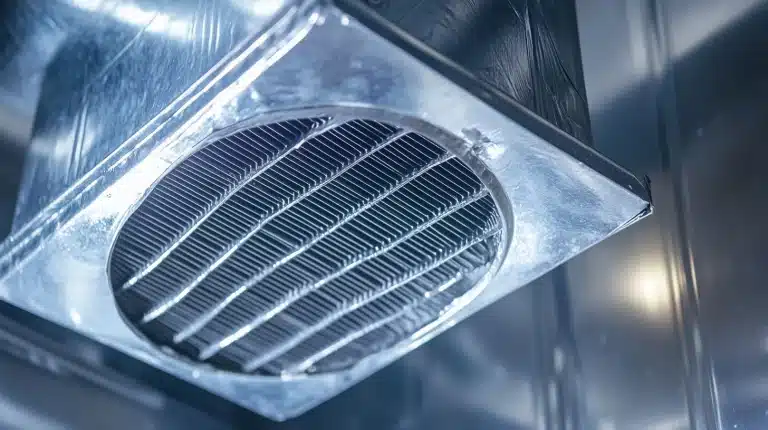Bathroom Countertops: Which One’s Best?
Choosing the right bathroom countertop can feel overwhelming with the numerous options available.
Your countertop faces daily water splashes, steam, and cosmetic spills that kitchen surfaces never encounter. The wrong choice leads to stains, cracks, and expensive repairs down the road.
Whether you prefer luxurious marble for a spa-like ambiance or budget-friendly laminate for rental properties, each material offers distinct benefits.
Some require minimal maintenance, while others need regular sealing. Some cost thousands, while others stay under budget.
This guide breaks down popular bathroom countertop materials, highlighting their honest cost. You’ll learn which options resist moisture best, which fit your maintenance style, and which deliver the look you want.
By the end, you’ll be able to choose the perfect countertop for your space confidently.
Why Your Bathroom Countertop Material Matters
Bathroom countertops work harder than any other surface in your home. They handle toothpaste spills at 6 AM, makeup application during busy mornings and steamy conditions that would damage other materials.
Unlike kitchen counters that deal with occasional spills, bathroom surfaces are constantly exposed to moisture from humidity, splashes, and cleaning products.
The wrong material choice creates ongoing headaches. Porous surfaces develop stains that are difficult to remove. Soft materials scratch from cosmetic containers. Materials that can’t handle moisture warp, crack, or harbor bacteria in ways that affect your family’s health.
Key Considerations Before Choosing a Countertop
- Moisture and humidity resistance: Choose materials that won’t warp, stain, or develop mold when exposed to daily steam and water splashes.
- Maintenance and durability: Select surfaces that can withstand daily use without requiring constant upkeep or frequent repairs.
- Aesthetics and bathroom style: Select colors and textures that complement your existing fixtures and overall design theme.
- Budget constraints: Set a realistic price range that includes both material costs and professional installation fees.
- Installation requirements: Consider if you need special support structures, professional tools, or skilled contractors for proper setup
Types of Bathroom Countertops
Study the most popular bathroom countertop materials, comparing style, durability, cost, and maintenance to help you choose the perfect fit for your space.
1. Granite Countertops
Granite brings timeless beauty to any bathroom with unique patterns and colors that nature has created over millions of years.
This natural stone withstands daily bathroom use without showing wear and resisting scratches, heat, and moisture when properly sealed.
However, granite requires sealing every 1-2 years to prevent stains and water damage. Regular cleaning with mild soap helps keep it looking fresh while avoiding acidic cleaners that can dull the surface.
2. Quartz Countertops
Quartz countertops offer the perfect blend of beauty and practicality for busy bathrooms. These engineered surfaces never need sealing because they’re manufactured to be non-porous, meaning spills wipe away easily without leaving stains.
Manufacturers create hundreds of color options and patterns, from solid colors to marble looks, with consistent patterns that eliminate surprises during installation.
While quartz costs more upfront than some alternatives, the superior performance and longevity justify the investment.
When considering bathroom countertops, it's essential to weigh the pros and cons of various materials. For instance,Quartz Countertops: Benefits and Drawbacksprovides an in-depth look at quartz countertops, highlighting their benefits and potential drawbacks.
3. Marble Countertops
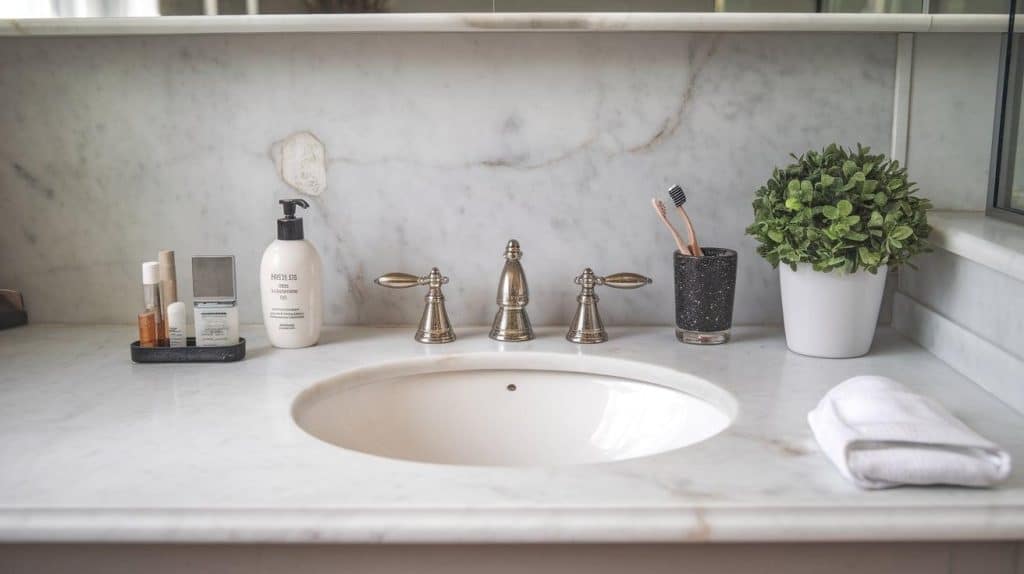
Marble creates an upscale spa-like atmosphere that transforms any bathroom into a luxurious retreat. White Carrara and Calacatta varieties remain popular choices, with their veining patterns adding visual interest and sophistication.
However, marble’s porous nature makes it vulnerable to stains from cosmetics and toiletries, while acidic substances can cause permanent etching.
This beautiful stone is best suited for low-traffic bathrooms, such as powder rooms or guest bathrooms, where maintenance requirements remain manageable.
Marble countertops offer timeless grace, but it's crucial to consider their maintenance needs.Marble Countertops: Weighing the Pros and Cons examines the advantages and disadvantages of marble, enabling you to make an informed decision.
4. Solid Surface
Solid surface materials create smooth, continuous surfaces without visible joints, making them ideal for clean, modern bathroom designs.
Integrated sinks blend perfectly with countertops, and the lack of grout lines means fewer places for bacteria to hide.
Fabricators can create custom shapes, colors, and integrated features. Minor scratches sand out easily, and more serious damage can be professionally repaired without requiring complete replacement. This mid-range option offers excellent design flexibility and long-term value.
5. Laminate Countertops
Laminate offers the most budget-friendly option for bathroom countertops, making it perfect for rental properties or temporary solutions.
Modern laminates have come a long way, convincingly mimicking granite, marble, and wood with hundreds of available patterns and colors. Textured surfaces add realism to stone and wood looks, creating attractive results at a fraction of the cost.
However, laminate surfaces are vulnerable to damage from hot styling tools and sharp objects, which can leave permanent marks that eventually require replacement.
6. Concrete Countertops
Concrete fits perfectly in contemporary and industrial bathroom designs, offering a modern, minimalist appearance that can be customized to match any vision.
Artisans can embed glass, shells, or decorative stones into concrete, creating unique surfaces with custom colors and integrated features, such as sinks.
However, concrete requires sealing to prevent stains and water damage, with resealing needed every few years to maintain protection. The heavyweight may also require cabinet reinforcement before installation.
7. Tile Countertops
Tile countertops offer the ultimate in design flexibility and budget-friendliness, making them perfect for DIY enthusiasts and creative homeowners.
Ceramic, porcelain, and natural stone tiles offer endless design possibilities, enabling you to mix and match colors, sizes, and patterns while incorporating decorative borders and accents. Homeowners can install tile countertops themselves with basic tools, creating significant labor savings.
However, grout lines need regular cleaning and periodic resealing, and stains and mildew can develop without proper maintenance.
8. Butcher Block / Wood Countertops
Wood countertops bring warmth and organic beauty to bathroom spaces, with teak, bamboo, and treated hardwoods creating natural grain patterns that add visual interest. This material offers a warm, natural feel that softens the typically hard surfaces found in bathrooms.
However, wood requires frequent oiling and sealing in bathroom environments, where moisture can cause warping, cracking, or rot.
Daily wiping prevents water damage, and food-safe sealers require application every 3-6 months, accompanied by sanding and refinishing when damage occurs.
9. Glass Countertops
Glass countertops create an ultra-modern bathroom look with their sleek, contemporary appearance, which works exceptionally well in minimalist designs.
Available in clear, frosted, or colored options, tempered glass can be enhanced with LED lighting underneath for dramatic effects. These surfaces resist stains and bacteria completely, requiring only glass cleaner and a soft cloth for maintenance, with no sealing or special care needed.
However, sharp objects can scratch glass surfaces, and impacts can cause chips or cracks that are more expensive to replace than to repair.
Bathroom Countertop Cost Breakdown
| Countertop Type | Price Range (per sq. ft.) | Notes on Pricing & Sources |
|---|---|---|
| Granite Countertops | $50 – $100 | High durability, natural stone appeal |
| Quartz Countertops | $60 – $120 | Engineered, low maintenance, premium price |
| Marble Countertops | $60 – $150 | Luxurious, high maintenance, best for low-traffic use |
| Solid Surface (e.g., Corian) | $35 – $85 | Seamless, customizable, moderate cost |
| Laminate Countertops | $5 – $15 | Budget-friendly, wide variety, less durable |
| Concrete Countertops | $60 – $110 | Modern, customizable, requires sealing |
| Tile Countertops | $12 – $30 | Affordable, DIY-friendly grout requires upkeep |
| Butcher Block / Wood | $35 – $85 | Warm, natural appearance, high maintenance |
| Glass Countertops | $70 – $170 | Sleek, modern look, can scratch or chip |
What’s the Best Countertop for Your Bathroom Type?
- Master Bathroom – Quartz countertops handle heavy daily use with zero maintenance while offering hundreds of design options for your primary space.
- Guest Bathroom – Granite provides an impressive look that wows visitors while requiring minimal upkeep, as usage remains light.
- Powder Room / Half Bath – Marble creates a maximum luxury impact in small spaces, where low traffic means maintenance concerns remain manageable.
- Kids’ Bathroom – Solid surface materials resist scratches and stains from daily chaos while allowing for easy repairs when accidents occur.
How to Choose the Right Countertop for You?
Selecting the perfect bathroom countertop depends on how you use the space and what fits your daily routine.
Consider whether this is a busy master bathroom that requires low-maintenance, durable materials or a guest bathroom where you can opt for more delicate options, such as marble.
Your lifestyle, honestly, may benefit from opting for high-maintenance materials that require less frequent sealing or special care, especially if you’re always rushing in the morning.
Make sure your countertop choice complements your existing tiles, vanity, and overall bathroom style, creating a cohesive look that feels intentional rather than mismatched.
Factor in your household’s needs, including children and pets, and the amount of time you realistically want to spend on upkeep, then choose the material that balances your aesthetic goals with practical requirements.
Final Thoughts
Your bathroom countertop choice shapes both daily function and long-term satisfaction. From durable granite and low-maintenance quartz to budget-friendly laminate, each option serves different needs and lifestyles.
The key is matching your selection to your specific situation. High-traffic master bathrooms need different materials than guest powder rooms. Busy families require different maintenance levels than empty nesters.
Moisture resistance is the top priority in bathroom environments; maintenance requirements should align with your lifestyle, and upfront costs should balance against long-term value.
The most expensive option isn’t always the best choice, and the cheapest might cost more over time.
Now that you understand the strengths and weaknesses of each material, you’re ready to make an informed decision.
What’s your biggest concern when choosing bathroom countertops? Share your thoughts in the comments below, and let us know which material appeals to you most.
Frequently Asked Questions
What Type of Countertop Is Best for a Bathroom?
Quartz offers the best overall performance for most bathrooms due to its non-porous surface, low maintenance needs, and excellent moisture resistance.
What Is the Cheapest Bathroom Countertop Material?
Laminate is the most affordable option, offering hundreds of colors and patterns while keeping costs low for budget-conscious homeowners.
What Is the Best Material for a Bathroom Vanity?
Solid surface materials, such as Corian, provide the ideal balance of durability, customization options, and seamless integration with sinks.
What Is Better for a Bathroom Vanity, Quartz or Granite?
Quartz wins for busy bathrooms because it never needs sealing and resists stains better, while granite offers more natural beauty but requires regular maintenance.

